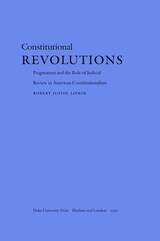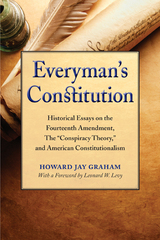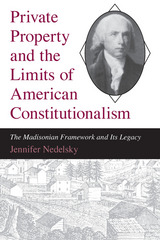4 books about American Constitutionalism

Constitutional Revolutions
Pragmatism and the Role of Judicial Review in American Constitutionalism
Robert Justin Lipkin
Duke University Press, 2000
In Constitutional Revolutions Robert Justin Lipkin radically rethinks modern constitutional jurisprudence, challenging the traditional view of constitutional change as solely an extension or transformation of prior law. He instead argues for the idea of “constitutional revolutions”—landmark decisions that are revolutionary because they are not generated from legal precedent and because they occur when the Constitution fails to provide effective procedures for accommodating a needed change. According to Lipkin, U.S. constitutional law is driven by these revolutionary judgments that translate political and cultural attitudes into formal judicial decisions.
Drawing on ethical theory, philosophy of science, and constitutional theory, Lipkin provides a progressive, postmodern, and pragmatic theory of constitutional law that justifies the critical role played by the judiciary in American democracy. Judicial review, he claims, operates as a mechanism to allow “second thought,” or principled reflection, on the values of the wider culture. Without this revolutionary function, American democracy would be left without an effective institutional means to formulate the community’s considered judgments about good government and individual rights. Although judicial review is not the only forum for protecting this dimension of constitutional democracy, Lipkin maintains that we would be wise not to abandon judicial review unless a viable alternative emerges.
Judges, lawyers, law professors, and constitutional scholars will find this book a valuable resource.
Drawing on ethical theory, philosophy of science, and constitutional theory, Lipkin provides a progressive, postmodern, and pragmatic theory of constitutional law that justifies the critical role played by the judiciary in American democracy. Judicial review, he claims, operates as a mechanism to allow “second thought,” or principled reflection, on the values of the wider culture. Without this revolutionary function, American democracy would be left without an effective institutional means to formulate the community’s considered judgments about good government and individual rights. Although judicial review is not the only forum for protecting this dimension of constitutional democracy, Lipkin maintains that we would be wise not to abandon judicial review unless a viable alternative emerges.
Judges, lawyers, law professors, and constitutional scholars will find this book a valuable resource.
[more]

Everyman's Constitution
Historical Essays on the Fourteenth Amendment, the "Conspiracy Theory," and American Constitutionalism
Howard Jay Graham
Wisconsin Historical Society Press, 1968
In 1938, Howard Jay Graham, a deaf law librarian, successfully argued that the authors of the Fourteenth Amendment--ratified after the American Civil War to establish equal protection under the law for all American citizens regardless of race--were motivated by abolitionist fervor, debunking the notion of a corporate conspiracy at the heart of the amendment's wording. For over half a century, the amendment had been used to endow corporations with rights as individuals and thus protect them from state legislation. By 1968, when Everyman's Constitution was first published, the Fourteenth Amendment had become a tool for the incorporation of the Bill of Rights to apply to all American citizens. The essays in this reprinted edition are still relevant as the nation continues to interpret our framing legislation in light of the concerns of today and to balance citizens' rights against those of corporations. Howard Jay Graham was a law librarian brought in by the NAACP's legal team to write a brief on the Fourteenth Amendment for the Supreme Court case Brown v. Board of Education. Though the Supreme Court justices ruled in favor of the NAACP based on the sociological rather than historical evidence it provided, Graham's work, published in various law journals over several decades, contributed greatly to the ongoing interpretation of the Fourteenth Amendment.
[more]

The Moral Tradition of American Constitutionalism
A Theological Interpretation
H. Jefferson Powell
Duke University Press, 1993
Debate over the relationship between morality and the law characterizes the contemporary discussion of American constitutionalism. Many theorists equate constitutionalism with the social morality of the American community; others deny the existence of such a community and identify constitutionalism simply as the positive law of the state. In this thoughtful and innovative book, H. Jefferson Powell presents a theological interpretation of the connection between constitutionalism and morality.
Powell locates the origins of constitutional law in the Enlightenment attempt to control the violence of the state by subjecting power to reason. He then traces constitutionalism's rapid evolution into a tradition of rational inquiry centered in the practice of adjudication and embodied in a community of lawyers and judges. Finally, Powell shows how the tradition's nineteenth-century presuppositions about the autonomy and rationality of constitutional argument have been undermined in the twentieth century, within the constitutional community itself, by the acceptance of a positivist and "democratic" understanding of law. Powell shows how the continued willingness of the courts to resolve moral questions by invoking "the Constitution" has thrown the constitutional tradition into an epistemological crisis. He critiques the work of many major theorists—John Hart Ely, Bruce Ackerman, Frank Michaelman, Rogers Smith, Michael Perry, Mark Tushnet, Robert Bork, Sanford Levinson—who, he claims, persist in attempting to resolve the crisis by redefining constitutionalism as American social morality.
With reference to Alasdair MacIntyre's concepts of moral tradition and social practice and John Howard Yoder's theological account of the state, Powell places his analysis of current constitutionalism within a contemporary Christian theological critique of Western liberalism. With certain exceptions, Powell concludes, there are theological grounds in the United States to prefer decision making by elected officials to decision by constitutional courts. Despite the controversial implications for judicial practice and legal argument, Powell ultimately argues that the liberal tradition of rational inquiry--American constitutionalism--be renounced by the Christian community in favor of the majoritarian political process.
Powell locates the origins of constitutional law in the Enlightenment attempt to control the violence of the state by subjecting power to reason. He then traces constitutionalism's rapid evolution into a tradition of rational inquiry centered in the practice of adjudication and embodied in a community of lawyers and judges. Finally, Powell shows how the tradition's nineteenth-century presuppositions about the autonomy and rationality of constitutional argument have been undermined in the twentieth century, within the constitutional community itself, by the acceptance of a positivist and "democratic" understanding of law. Powell shows how the continued willingness of the courts to resolve moral questions by invoking "the Constitution" has thrown the constitutional tradition into an epistemological crisis. He critiques the work of many major theorists—John Hart Ely, Bruce Ackerman, Frank Michaelman, Rogers Smith, Michael Perry, Mark Tushnet, Robert Bork, Sanford Levinson—who, he claims, persist in attempting to resolve the crisis by redefining constitutionalism as American social morality.
With reference to Alasdair MacIntyre's concepts of moral tradition and social practice and John Howard Yoder's theological account of the state, Powell places his analysis of current constitutionalism within a contemporary Christian theological critique of Western liberalism. With certain exceptions, Powell concludes, there are theological grounds in the United States to prefer decision making by elected officials to decision by constitutional courts. Despite the controversial implications for judicial practice and legal argument, Powell ultimately argues that the liberal tradition of rational inquiry--American constitutionalism--be renounced by the Christian community in favor of the majoritarian political process.
[more]

Private Property and the Limits of American Constitutionalism
The Madisonian Framework and Its Legacy
Jennifer Nedelsky
University of Chicago Press, 1990
The United States Constitution was designed to secure the rights of individuals and minorities from the tyranny of the majority—or was it? Jennifer Nedelsky's provocative study places this claim in an utterly new light, tracing its origins to the Framers' preoccupation with the protection of private property. She argues that this formative focus on property has shaped our institutions, our political system, and our very understanding of limited government.
[more]
READERS
Browse our collection.
PUBLISHERS
See BiblioVault's publisher services.
STUDENT SERVICES
Files for college accessibility offices.
UChicago Accessibility Resources
home | accessibility | search | about | contact us
BiblioVault ® 2001 - 2024
The University of Chicago Press









